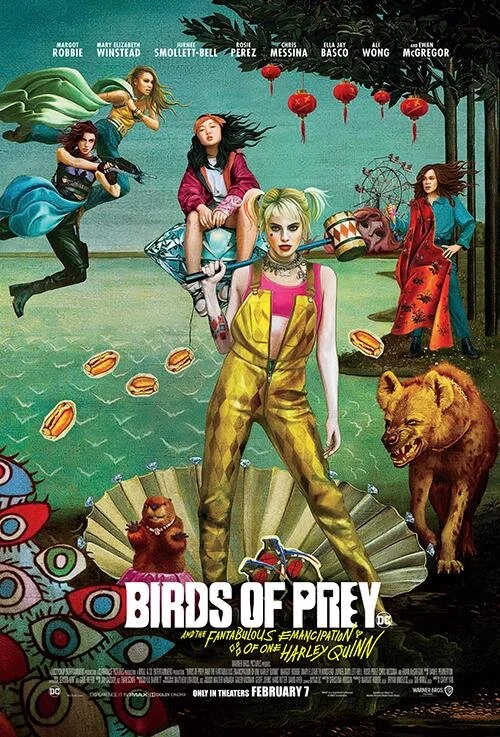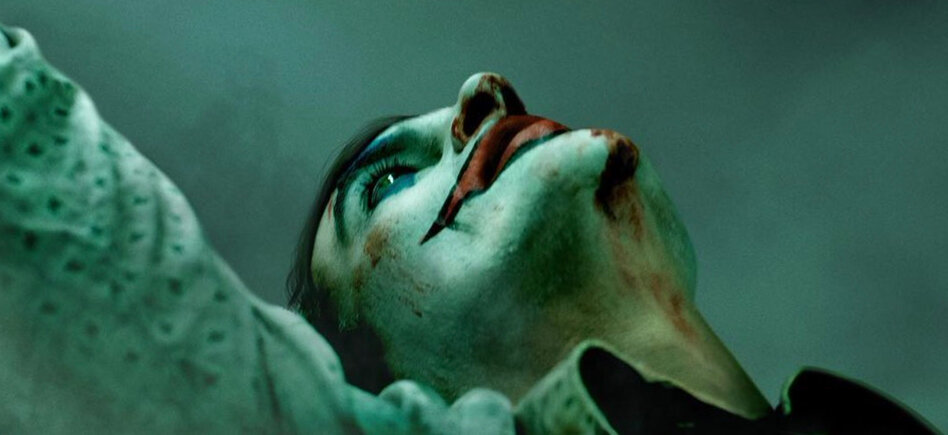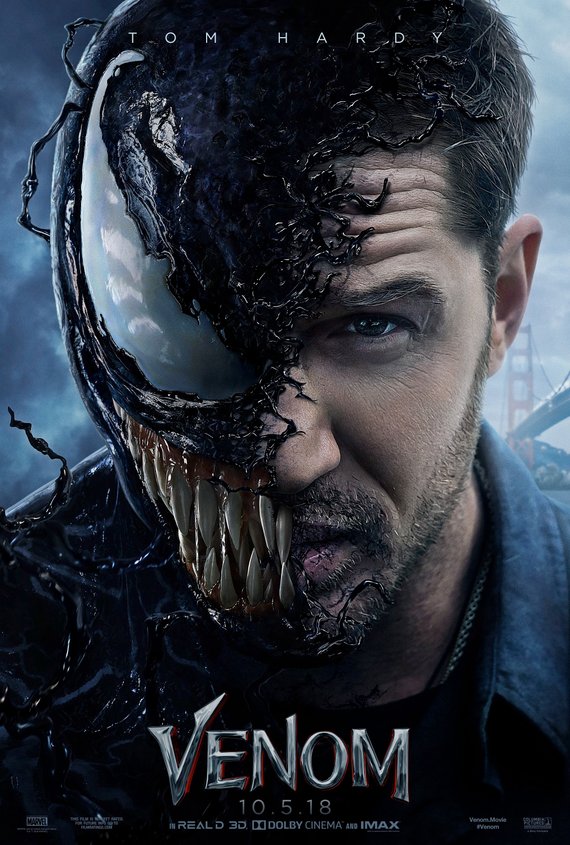Ever since that first bit of footage was leaked from Comic Con last year…:) Suicide Squad has been presumed to be destined for resounding critical praise and warm audience embrace. The marketing has been out of this world, interest and awareness are high, and it taps into some of the same sensibilities that made Guardians of the Galaxy and Deadpool so beloved and popular. In fact, if you can imagine Guardians of the Galaxy’s anti-hero team dynamics and humor (dialed down a couple of notches but still frequent) mixed with Deadpool’s more cynical tone and extreme ultra violence, that’s a pretty good way to describe what to expect from Suicide Squad. After having just seen this movie I think this movie will mostly get the sort of positive reaction everyone expects when it officially comes out Aug 5th, but I also think it won’t wind up quite as acclaimed as those two films, for a few reasons.
I personally believe it’s a great film; I loved a lot of it and really liked most of the rest. It’s going to make most fans very happy — after my screening, I talked to several other critics/ guests afterwards to gauge their reactions and watched how other viewers acted, and it seemed the consensus was that the film is very good and entertaining for the casual film goer/DC fan. Critics, however, were a bit more mixed. The few that I talked to seemed to like it as much as the fans did, but there were several others who clearly disliked the movie and were vocal about it. I mention this to prepare you for the fact that this film might wind up more in the 60-70+% range at Rotten Tomatoes instead of 75-85+% range.
Maybe I’m mistaken, and maybe my screening was an outlier in terms of critical reactions afterward. However, I realize certain aspects of this film will likely lead to certain previous complaints about the DCU rearing their heads again — lots of violence, a cynical sort of tone despite the sense of humor, dark (meaning nighttime, unlit interiors, etc) visuals and mild desaturation of colors, and using a cast of many characters to at times hastily introduce everyone and more quickly establish the wider DCU, for example.
Again, I am not agreeing with those complaints at all. I’m just preparing fans for the fact they’re going to see some reviews raising those issues (in fact there’s some already out there raising that issue), and that the reviews will be positive but not quite as glowing as everyone probably expected. I’ll be happy to be proven wrong, though.
Now that I’ve probably caused some of you readers to hold their breath or get worried, let me get to all the things that work so well and make Suicide Squad a winning combination sure to win over yourself and the rest of the audience
Halloween 2016 costumes of the night.
Lets get this out of the way now Jared Leto and Margot Robbie really steal the movie as the Joker and Harley Quinn. That’s not to say the rest of the cast aren’t terrific — they are, and I’ll talk about them in a bit— but the subplot involving these two is such dastardly fun, and they’re so perfectly cast in their respective roles, that even if you don’t enjoy the rest you’re bound to appreciate every moment Leto and Robbie are on screen.
We all suspected Harley Quinn would be a breakout character, and of course that’s precisely what happens. Robbie brings Harley to wonderful, vivid life, and we get to see much more about her than the trailers let on — including some amazing “Easter egg” shots featuring her and the Joker that will leave fans squealing with delight. She and Will Smith’s Deadshot are pretty much the main anchors for the story, as we see much of what transpires from their perspective and the events tend to revolve around them most of the time. Harley has added importance to the story, since she’s not only crucial to the main plot but also has a major subplot (with the Joker) that drives events throughout the entire film.
Robbie plays Harley as absolutely a villain protagonist. She likes being bad and embraces it, despite being funny and charming along the way. Yet we get a few flashes of her sympathy for other baddies in the group, and a momentary glimpse of her most secret and simple desire, and it helps humanize her so she doesn’t come off as cartoonish, nor too cruel or unrelatable.
The Joker was already portrayed to Oscar-winning perfection by the late Heath Ledger in 2008′s Batman blockbuster The Dark Knight, so Leto had his work cut out for him. Some other fans and reviewers have said we shouldn’t try to compare the two performances, but I feel that’s not a realistic way to approach the situation, since of course we’re going to compare them — how could we not? It’s the same character, the previous incarnation won 99% of all awards it was nominated for and is widely considered one of the best villain performances on film, and so naturally everyone wants to know if the new Joker lives up to that legacy.
Lucky for us, Leto delivers a bold, “original” portrayal that makes the role his own. Ledger’s Joker existed in a world heavily grounded in realism, and while entirely faithful to the comics it was also an attempt to reimagine the character in a unique picture that didn’t want to feel like a literal living comic book. It was actually a somewhat subdued, controlled version of the Joker in many ways. He seemed unconcerned with flair or vanity despite his intentionally dramatic appearance, and had an insanity that (contrary to his claims to other characters in the film) maintained a laser-like focus and never strayed into arbitrary behavior or mood swings causing sudden changes in the manifestation of his evil nature.
Leto, in contrast, is a Joker who stepped right out of a comic book, with a rock-star status among super-villains and a madness that seems unhinged and unpredictable (even while pursuing a specific, simple goal). He almost slithers across the screen sometimes, and makes the simplest statements drip with malice and terrible implications of violence. The characterization feels generally inspired by a few key comic book sources — most obviously, the Joker from Frank Miller’s The Dark Knight Returns and the Joker from Scott Snyder’s monthly Batman comics of the last several years. But despite those sources of influence, it is a wholly distinctive version of the character and feels exactly right for the new DCU. I’m excited to see this Joker again, as we surely will (I’m almost certain he’ll appear in the solo Batman movie), and Leto deserves all the praise he’s going to inevitably get for doing the seemingly impossible — creating a brand new Joker who will not pale in comparison to Ledger’s iconic portrayal. Oddly enough the main criticism he's getting in reviews is due to his look, an I'll admit it that it is distracting. Mainly cause if you take away the teeth, the tattoos, and the purple Lamborghini. His joker portrayal is hauntingly good an effective. But I feel it's under shadowed by all the window dressing they put on him. I'm just letting you all know now. No there is not any explanation on the tattoos, they're just there, an that's stupid.
Two other standout characters from the super-villain team are Smith’s Deadshot and Jay Hernandez as Diablo, both of whom really serve as the moral compasses for the crew and story. Which is odd, since both are mass murderers, Diablo having a particularly dreadful background. Yet they are each — in their own way — struggling with their own humanity and hoping for some sort of redemption, however out of reach it seems. Hernandez was a real surprise, as the trailers didn’t truly show his significance and richer characterization. Smith meanwhile is always a joy to watch, and he brings all of his talents to bear in Suicide Squad, turning Deadshot into an instant A-level villain.
Karen Fukuhara as Katana
Adewale Akinnuoye-Agbaje’s Killer Croc is far more snarky and funny than expected, on top how fully realized he is visually — which by the way is consistently realistic and effective all the way through the film, the CGI and makeup work on him being impressive from start to finish. Jai Courtney defies all the jokes and complaints you’ve heard about him from other films, his Boomerang being a source of some of the film’s best sight gags (many of them of the blink-and-you’ll-miss-it variety) and getting lots of mileage out of his accent. It’s the best performance I’ve seen from him, irreverent and full of personality. Karen Fukuhara as Katana doesn’t get a lot of scenes to herself, but she has a few really good ones and is especially entertaining when her dead-serious demeanor underlines a decidedly humorous statement or silent action.
Finally a movie that people don't hate me in
Joel Kinnaman wound up being a pretty great choice for Rick Flag. Tom Hardy originally had the role, but honestly Jai Courtney’s Boomerang has an unexpected but not-insignificant resemblance (physically, behaviorally, and even oddly verbally at times) to Hardy (notably, Hardy’s performance as Alfie in Peaky Blinders), so it could’ve been distracting to have them both in the film together. I know that sounds crazy, but it’s true. Kinnaman meanwhile hits exactly the right notes and has good chemistry with Will Smith (which matters for the story). Viola Davis is never less than brilliant, and she was obviously exactly right for Amanda Waller. In a film featuring the Joker and Killer Croc, Waller delivers one of the single most mean, brutal scenes and proves herself to be every bit the villain-protagonist like the rest of her crew.
Cara Delevingne’s Enchantress
Cara Delevingne’s Enchantress helps make it clear Suicide Squad is absolutely a comic book movie, full of fantasy and wild ideas that are decidedly not “grounded in realism.” Her character serves multiple roles in the film, one of the most interesting being the subtext regarding her relationship with Kinnaman’s Flagg. That relationship informs both of their arcs and the story as a whole, and while she spends most of her time in evil-witch mode, it’s interesting watching Kinnaman and remembering his feelings for her are ever-present in the back of his mind. Delevingne is (no pun intended) spellbinding as the unearthly character, with inhuman movements like something from a horror film, her character made me think of The Witch at times.
With directing credits like the phenomenal End of Watch and the powerful Fury, David Ayer showed us what he was capable of, and his trend of artistic success continues with Suicide Squad. He has written and directed an audacious comic book movie, giving us ruthlessly wicked characters — not just the villain teammates, but also the supposedly “good guys” who control them — and investing them with pathos and charm that makes us root for them. He keeps things moving at a brisk speed, setting up the context of the main event early and dropping our anti-heroes into the middle of it, so we can watch them maneuver through one conflict and personal crisis after another until they congeal as a misfit team left with nobody but each other.
Suicide Squad has certain tonal and stylistic similarities to Man of Steel and Batman v Superman, because all of these films are part of a larger world together and it’s important to have certain aesthetic links to help it all fit together better. The same is true of Marvel’s approach — on the one hand the MCU films each have filmmakers with particular approaches and styles and visions, and the movies themselves are each of a very particular subgenre; yet they all feel like they’re part of the same “Marvel Universe,” so any character can step out of one film and into another without feeling out of place at all. So here, when we see Batman taking on the Joker or Deadshot, it fits right alongside Batman’s appearance in Batman v Superman without a hitch. Also, Ben Affleck turns in another very good performance as Batman. People misread my last review with how I talked about him. My problem in BVS was not Affleck’s portayel. But how the character was written. Here in this movie I’m happy to see those changes have been rectified.
On the other hand, Suicide Squad takes the entire DCU a very big step closer to live-action comic book territory. While Batman v Superman ended with a giant alien non-Doomsday monster and Wonder Woman using her magic lasso, most of the movie tried to keep the world around the heroes grounded and realistic, similar to how Man of Steel approached things. Suicide Squad doesn’t even try to explain witches and mutated monster-men and swords that trap the souls of its victims, and the world in which it all exists is one teaming with metahumans and sci-fi gadgetry and outrageous turns of events. While it’s still several more steps toward dark-and-violent than a Marvel movie, it’s getting into the same ballpark but with a different attitude and perspective about things, in other words.
Speaking of violence, be warned — this is a very violent picture, and some of the violence is mean and uncompromising. It’s also scary, with the Joker and Killer Croc and Enchantress providing a lot of creepy, nightmarish moments. Certain young children might need to wait a few years before they see this one. But the action is superb, in a fast-paced tale that only pauses a couple of times to catch its breath. We get flashback “origins” or introductions to the main villain-protagonists, a setup for Waller and her idea for the new team, and then the catalyst that forces Waller to quickly deploy the Suicide Squad into the field to save the world — and rest assured, there’s a reason (or several reasons, all revealed slowly and never before absolutely necessary) this team is tasked with the mission instead of (for example) calling on Batman or some other superheroes to intervene. Meanwhile, in the middle of all this Armageddon the Joker has his own plans and keeps throwing a wrench into things.
I also loved the fact we got some matter-of-fact Batman moments here and there, the way a comic might reference some other prior issue or story and we’d see a panel or two depicting the relevant events for context. That’s another way Suicide Squad feels more like an actual comic book come to life than any other 21st Century DC Comics superhero movie.
There are some minor quibbles I have with the film, most important being that the superhero genre has a recurring problem with establishing villains’ immense powers only to have them hold back in the climax and resort to simplistic fisticuffs when they could be waving their hands making the impossible take place instead. X-Men: Apocalypse is the worst offender in recent memory, and a perfect extreme example of what I’m talking about — early in that film, he’s waving his hand making people or things turn to dust and blow away, and he’s able to manipulate matter with his mind; but when the X-Men attack him, he resorts to punches and throwing them around physically…smh
In Suicide Squad, we literally see a villain shooting bursts of intense energy into the sky one moment, and the next moment trying to kick and trip Squad-members in a fistfight. I realize the need to get the heroes and villains into a direct confrontation, but that means these movies have to avoid over-powering the villains so often, or come up with more creative ways to get them into physical conflict with the heroes at the end.
One other complaint I have is that the soundtrack is mostly great, but there are quite a few misfires that distract from otherwise fun and important scenes. For example, Eminem’s “Without Me,” especially the portions sampled (which were edited together in a disjointed way), felt very out of place, it’s a shame it wasn’t better incorporated.
(Ok time to wrap this up)
Suicide Squad takes the superhero genre in a new direction, letting the bad guys be bad guys even while they’re forced into service for supposed “good.” It’s crowd-pleasing genre entertainment with delightful performances, eye-popping visuals, fun Easter eggs and super-cameos for the fans, and a promise that the DCU will offer a wide variety of approaches and characters in the coming years. Oh and be sure to stay after the credits for the mother of all post credits scenes.
9/10
drink up guys, you deserve it.





















